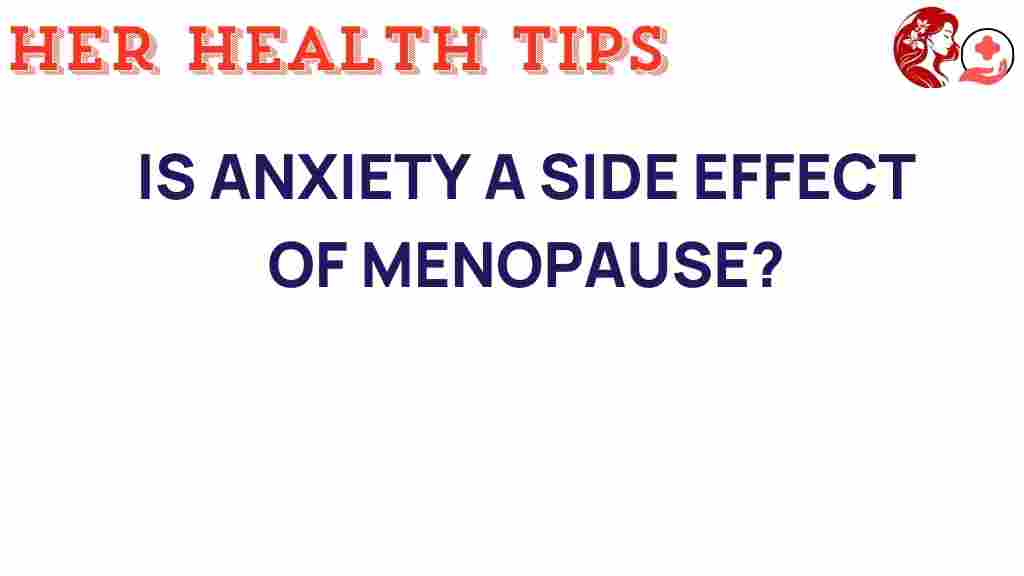Unraveling the Mystery: Is Anxiety a Hidden Side Effect of Menopause?
Menopause is a natural stage in a woman’s life that comes with various physical and emotional changes. One of the lesser-discussed yet significant aspects of this transition is the relationship between menopause and anxiety. Many women find themselves grappling with increased anxiety levels during this period, but why is this the case? In this article, we will explore how hormonal changes during menopause can affect mental health, the symptoms associated with this anxiety, and ways to manage emotional well-being during this challenging time.
Understanding Menopause and Hormonal Changes
Menopause marks the end of a woman’s reproductive years, typically occurring between the ages of 45 and 55. This transition is characterized by the gradual decline in the production of hormones such as estrogen and progesterone. These hormonal changes are not only responsible for physical symptoms like hot flashes and night sweats but can also significantly impact a woman’s mental health.
The Connection Between Menopause and Anxiety
Anxiety can manifest in various forms, such as generalized anxiety disorder, panic disorder, or social anxiety. During menopause, many women report a rise in symptoms of anxiety, which can be attributed to several factors:
- Hormonal fluctuations: The decrease in estrogen can lead to alterations in neurotransmitter systems, affecting mood regulation.
- Physical symptoms: Symptoms such as sleep disturbances, hot flashes, and fatigue can contribute to heightened anxiety levels.
- Life changes: Menopause often coincides with other life transitions, such as children leaving home or aging parents, which can lead to increased stress and anxiety.
Understanding these connections is essential for addressing mental health concerns related to menopause.
Common Symptoms of Anxiety During Menopause
Women experiencing anxiety during menopause may notice a variety of symptoms, including:
- Constant worry or fear
- Increased heart rate
- Difficulty concentrating
- Restlessness or feeling on edge
- Sleep problems, such as insomnia
- Physical symptoms like tension headaches or digestive issues
Recognizing these symptoms is the first step toward managing anxiety effectively.
Impact of Anxiety on Women’s Health
It’s crucial to understand that anxiety can have broader implications for women’s health, especially during menopause. Chronic anxiety can lead to:
- Increased risk of depression
- Cardiovascular problems
- Weakened immune system
- Difficulty with interpersonal relationships
- Adverse effects on overall emotional well-being
Given these potential consequences, it’s vital for women to prioritize their mental health during menopause.
Step-by-Step Process: Managing Anxiety During Menopause
Managing anxiety during menopause involves a multi-faceted approach. Here’s a step-by-step guide:
1. Recognize the Signs
The first step is to identify and acknowledge the symptoms of anxiety. Keeping a journal can help track anxiety triggers and patterns, allowing for better understanding and management.
2. Consult a Healthcare Provider
Seeking professional help is essential. A healthcare provider can offer guidance tailored to individual needs, which may include:
- Hormone replacement therapy (HRT)
- Antidepressants or anti-anxiety medications
- Cognitive-behavioral therapy (CBT)
3. Adopt Healthy Lifestyle Choices
Making lifestyle adjustments can have a profound impact on anxiety levels:
- Regular exercise: Engaging in physical activity releases endorphins, which can improve mood and reduce anxiety.
- Balanced diet: Consuming a diet rich in fruits, vegetables, whole grains, and lean proteins can support overall health.
- Sufficient sleep: Establishing a regular sleep routine can help combat insomnia and improve mental health.
4. Practice Mindfulness and Relaxation Techniques
Incorporating mindfulness and relaxation strategies can be beneficial:
- Deep breathing exercises: These can help calm the nervous system and reduce anxiety.
- Meditation: Regular meditation practice can enhance emotional well-being.
- Yoga: Mindful movement through yoga can alleviate stress and promote relaxation.
5. Build a Support Network
Connecting with friends, family, or support groups can provide emotional support and reduce feelings of isolation. Sharing experiences with others going through similar changes can be comforting and empowering.
Troubleshooting Tips for Anxiety Management
If you find that anxiety persists despite your efforts, consider the following troubleshooting tips:
- Identify Triggers: Keep a record of situations that increase your anxiety to better understand what to avoid or manage.
- Stay Informed: Educate yourself about menopause and anxiety to reduce fear of the unknown.
- Limit Caffeine and Alcohol: Both can exacerbate anxiety symptoms; reducing intake may lead to improvements.
- Explore Alternative Therapies: Some women find relief through acupuncture, herbal supplements, or aromatherapy.
Conclusion
In conclusion, anxiety can indeed be a hidden side effect of menopause, largely stemming from hormonal changes and the accompanying physical and emotional shifts. Understanding the connection between menopause and anxiety is crucial for women’s health and emotional well-being. By recognizing symptoms and taking proactive steps to manage anxiety, women can navigate this challenging phase of life more effectively. Remember, seeking help and building a support network can significantly enhance mental health during menopause.
If you or someone you know is struggling with anxiety during menopause, consider reaching out to a healthcare professional for guidance and support. For more information on women’s health and menopause, visit this resource. To learn more about managing anxiety, check out this article.
This article is in the category Reproductive and created by HerHealthTips Team
